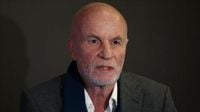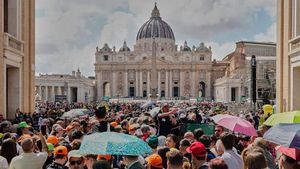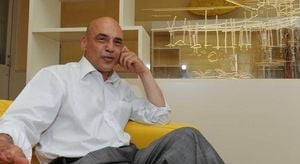On Wednesday, renowned French political scientist François Burgat faced the criminal court of Aix-en-Provence, charged with "apology of terrorism" stemming from his social media posts regarding the ongoing genocide in Gaza. The prosecution has called for an eight-month suspended prison sentence, which has raised significant concerns about freedom of expression and academic discourse.
Burgat, 77, an esteemed islamologist and former director of research at the CNRS, found himself in the courtroom following a report from the DGSI (General Directorate for Internal Security) and a complaint from the European Jewish Organization (OJE). The investigation into his posts began after he reposted a statement from Hamas leaders in January 2024, which denied allegations of sexual violence against hostages taken during the October 7 attacks.
During the court proceedings, Burgat maintained a calm demeanor, often shifting his gaze between the presiding judge, Sarah Chaib, and the civil parties present. He responded vigorously to questions about his tweets, which included comments on the Israeli-Palestinian conflict and the assassination of French teacher Samuel Paty.
One of the contentious tweets that contributed to the charges was a repost of Hamas's official denial regarding the accusations of sexual violence. In defending his position, Burgat stated, "I have infinitely more respect and consideration for the leaders of Hamas than for those of the State of Israel." This assertion has sparked outrage and debate, with critics arguing that such statements could be interpreted as endorsing terrorism.
As the prosecution laid out its case, they requested not only the suspended prison sentence but also a fine of 4,000 euros, a six-month ban from social media, and a two-year period of ineligibility. The prosecutor emphasized that Hamas is classified as a terrorist organization by the European Union, underscoring the gravity of Burgat's alleged offenses.
Supporters of Burgat packed the courtroom, including Rony Brauman, former president of Médecins Sans Frontières (Doctors Without Borders). Brauman articulated a broader concern, stating, "The apology of terrorism is used today to silence criticism, while we are witnessing a genocidal war." His comments resonated with many in attendance, who viewed the trial as an attack on academic freedom.
Throughout the proceedings, the tension between freedom of expression and the legal implications of promoting terrorism was palpable. The president of the tribunal reminded those present that the court must navigate the fine line between these two principles. Burgat himself acknowledged the complexity of the situation, asserting, "I am not here to convince you that I am right; I am here to convince you that I have the right to present this argument in public."
Despite his defense, the prosecutor remained unconvinced, calling for a sentence that would serve as a warning against the misuse of free speech in a context that could be interpreted as supporting terrorism. As the courtroom awaited the verdict, set to be announced on May 28, 2025, many speculated about the implications of the ruling for academic discourse in France.
Burgat's lawyers argued for his acquittal, emphasizing that a conviction, even a symbolic one, would represent a serious infringement on academic freedom, especially at a time when France is welcoming American researchers. They expressed concern that the case could set a troubling precedent for scholars and intellectuals who engage in controversial discussions.
As the trial unfolded, the atmosphere was charged with emotion. Supporters voiced their discontent with the proceedings, with one attendee stating, "The arguments presented by the prosecution were horrifying; I had to leave the courtroom because I felt physically ill." The trial has not only drawn attention to Burgat's case but has also sparked a wider debate about the limits of free speech in the context of political discourse.
In his closing remarks, Burgat reflected on his long career in academia, stating, "I have been involved in legal matters for a long time, but this is my first time in the defendant's seat." His words echoed the sentiments of many who believe that the trial represents a broader struggle for academic freedom in an increasingly polarized political landscape.
As the date for the verdict approaches, the outcome remains uncertain. Burgat himself has expressed doubts about the trial's fairness, suggesting that he may need to appeal the decision regardless of the ruling. "I would like to rid myself of this burden, as I am at the end of my life and would prefer to focus on my personal matters, but I fear that we will have to go to appeal; I am not overly optimistic about this verdict, as I believe it is just a step in a longer journey," he said.
The case has captured the attention of many, highlighting the delicate balance between free expression and the potential consequences of one's words in a charged political environment. As the legal proceedings continue, Burgat's fate hangs in the balance, with implications that may resonate far beyond the courtroom.




